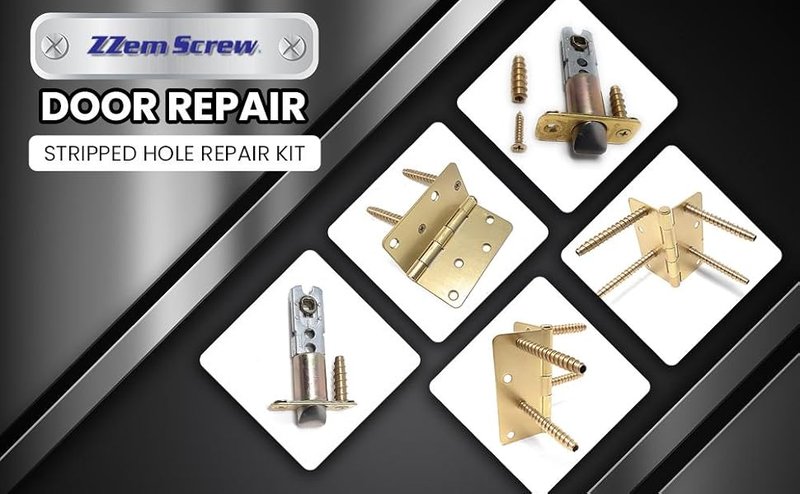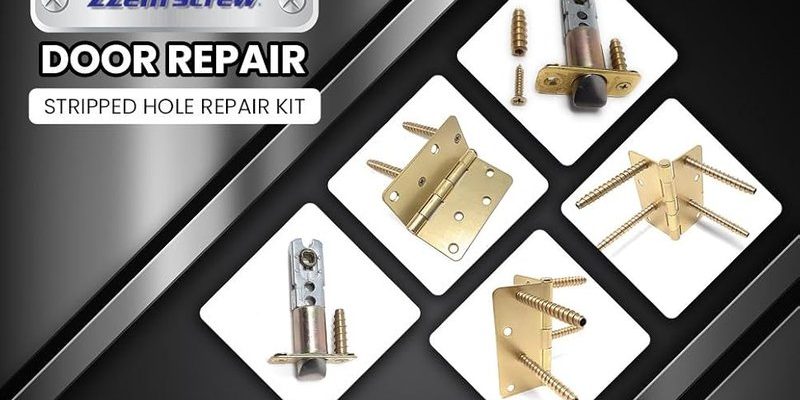
To make the job easier, you’ll want to choose the right screws for your door hardware. This isn’t just about grabbing whatever’s lying around in your toolbox. Picking the proper screw can make the difference between a quick fix and a headache down the line. So, let’s take a closer look at how to select the best screws for replacing stripped door hardware screws and ensure your doors work as they should.
Understanding Stripped Screws and Their Impact
Stripped screws are damaged screws that can no longer hold tightly in their drilled holes. When you strip a screw, the threads become worn and no longer grip the material—be it wood, metal, or plastic. Strong screws give your door hardware stability, and without that, you may face issues like squeaking hinges or doorknobs that won’t stay attached.
You might be wondering why this happens. Well, over time, screws can get loose from everyday use, or they might have been over-tightened during installation. Sometimes, the original screw was simply too short or of poor quality. Whatever the reason, replacing them with the right screws is essential for maintaining the function and safety of your door hardware.
Choosing the Right Type of Screws
Not all screws are created equal, and choosing the right type makes a significant difference. You generally have two main choices: wood screws and machine screws.
– Wood screws are designed specifically for joining pieces of wood. They have a sharp tip to help them dig into the wood easily. Look for wood screws with a coarse thread for better grip, especially if you’re dealing with softwoods like pine.
– Machine screws, on the other hand, work well when you need to secure metal to metal or metal to plastic. They have a uniform thread and often require a nut or a threaded hole.
When replacing stripped screws, the length and diameter of the screw are crucial. Make sure to get screws that are the same length as the originals, or slightly longer if the wood has been damaged. A good rule of thumb is that about half of the screw should be embedded into the door frame for a secure fit.
Materials Matter: Steel vs. Stainless Steel
The material of the screw is just as important as its type. You’ll typically find screws made from steel or stainless steel.
– Steel screws are durable and often coated for rust resistance. They’re great for indoor use where they won’t face moisture. However, if they’re exposed to the elements, rust will quickly become an issue.
– Stainless steel screws are your go-to for outdoor applications. They have a higher resistance to corrosion, thanks to their chromium content. If you live in an area with high humidity or rain, investing in stainless steel screws will save you from future replacements.
Whenever you can, choose screws that match the finish of your hardware. This attention to detail keeps everything looking tidy.
Using the Correct Screw Size
Now, you might be wondering how to determine the right screw size. Generally, this comes down to a combination of the screw diameter and length.
1. Diameter: This is the width of the screw. For door hardware, a diameter of around 6 to 8 gauge is common. The larger the gauge number, the smaller the diameter.
2. Length: Measure the original screw’s length from the top of the head to the tip. If it’s stripped, you might need to go a little longer, but not so long that it pokes through the other side of the door frame.
A good way to ensure your new screws will fit is to bring an original screw to the hardware store. This makes for a stress-free shopping experience as you can compare directly.
Alternative Solutions for Stripped Holes
If the stripped hole is too large for a standard screw, fear not! There are alternative solutions that can save the day. One popular method is to use a wood filler or toothpick method.
– Wood filler: This is a quick fix where you fill the stripped hole with wood filler, let it dry, and then re-drill a new hole for your screw. This provides a solid base for the screw to hold securely.
– Toothpicks: If you’re in a pinch, inserting a couple of wooden toothpicks into the hole with some wood glue can work wonders. Break off the excess length, let it dry, and you’re ready to reinsert the screw.
Both methods are simple yet effective, allowing you to extend the life of your door hardware.
Where to Buy the Best Screws
When it comes time to purchase your screws, you have various options, from local hardware stores to online retailers. Here are a few tips:
– Local Hardware Stores: A great place to find a wide range of screws. You can also get advice from knowledgeable staff.
– Home Improvement Stores: Larger stores often have a more extensive selection, including specialty screws for specific needs.
– Online Retailers: If you want convenience, check sites like Amazon or Home Depot’s website. You can read reviews and comparisons easily.
Make sure to pay attention to the product details. Look for screws that mention they are designed for door hardware to ensure you’re making the right choice.
Final Thoughts: A Simple Fix for a Common Problem
Replacing stripped door hardware screws may seem overwhelming at first, but it’s quite manageable with the right information. By understanding the types of screws, materials, and sizes, you’ll be better equipped to tackle the job. Remember, taking the time to select the appropriate screw will lead to a secure and functional door, saving you from future headaches.
Not only will your door hardware look great, but it will also work effectively for years to come. So next time you face stripped screws, you’ll know exactly how to fix it. Let’s keep those doors swinging smoothly!
